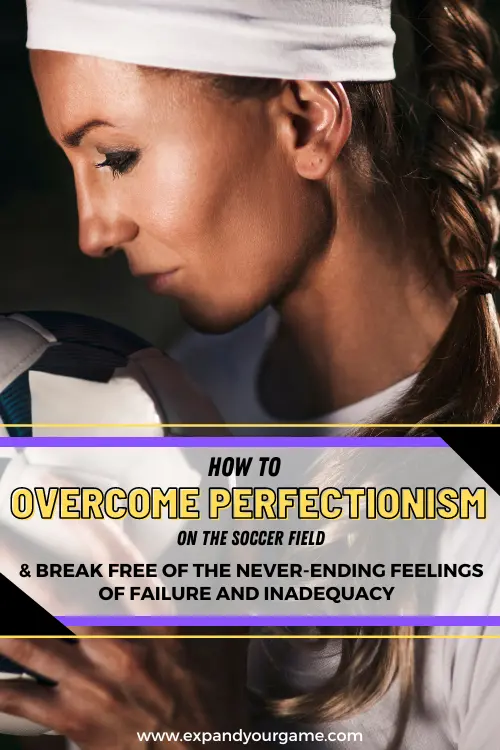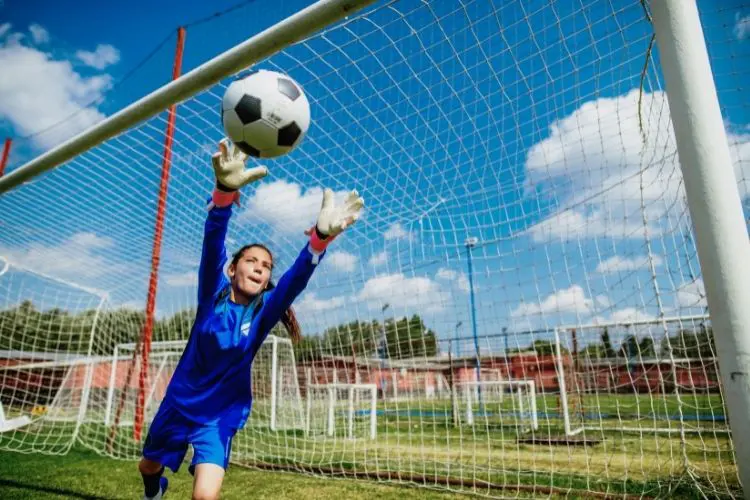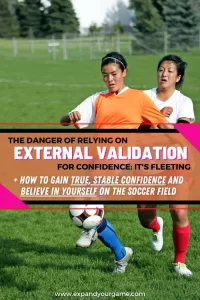
Perfectionism in soccer is a very real issue that holds many players back from maximizing their potential and finding true passion and joy on the soccer field.
This Post Contains:
Is perfectionism holding you back?
Unsure if you are dealing with perfectionism on the soccer field? Ask yourself this: in order to feel good about yourself and your play, do you NEED to meet the high expectations you have of yourself to not make mistakes?
If you said yes, there’s a pretty good chance that your self-worth feels directly tied to what happens on the soccer field. This can be a really sucky feeling. And this is perfectionism in a nutshell (the toxic kind, not the helpful kind, more on that further into the post).
But more often than not, perfectionistic tendencies tend to get a little out of control and can easily go way beyond what is healthy and helpful. And this is when perfectionism in soccer starts to hold you back. This is when working to overcome perfectionism becomes necessary for forward progression.
'Being Perfect' is not possible

Perfectionism in sports can hurt an athlete’s confidence as well as lead to a negative, anxious, self-defeating mindset where players are overcritical of their performance and unable to accept anything from themselves that is less than perfect. Perfectionism holds you back by keeping you small. It holds you back by instilling you full of limiting beliefs that prevent you from maximizing your true potential and being able to reach peak performance.
‘Being perfect’ is an illusion that is not achievable by anyone. It’s a delusion that traps you in never-ending feelings of inadequacy and failure. Since ‘being perfect’ isn’t possible, you will ALWAYS fall short of your impossible expectations of perfection and end up feeling bad about yourself. Every. Single. Time.

Quiz: is your perfectionism holding you back?
Is perfectionism negatively impacting your soccer game
OR is it helping you stay focused to fine-tune your skills?
What is perfectionism, truly?
For me, perfectionism has always shown up as a constant striving for flawlessness and hyper-focusing on impossibly high, unrealistic standards of myself. While I still have a ton of work to do to overcome perfectionism, I CAN say that simply being aware of it, talking about it, and not denying its existence has helped me immensely. Which is why I’m writing this blog post – to help soccer players face their perfectionism and work to overcome it or at least harness it in a better, more productive direction.
"Perfectionism is not the key to success. In fact, research shows that perfectionism hampers achievement."
"The fear of failing, making mistakes, not meeting people’s expectations, and being criticized keeps us outside of the arena where healthy competition and striving unfolds."Brené Brown, Daring Greatly
My perfectionism story
Since my list is about 4,579 items long and constantly growing, I never seem to get anywhere and end up perpetually feeling like a crappy person. My perfectionistic logic says that if I could just be highly productive, constantly multi-tasking and DO-ALL-THE-THINGS then (and only then) I will be ‘good enough’. It’s flawed logic and the smart, thinking part of my brain knows this. But the monkey mind part – the unconscious, restless, socially conditioned, constantly distracted part – is missing the message.
perfectionism's impact

Brené is a research professor at the University of Houston and has written several great books on the subjects of vulnerability, courage, shame and empathy. Working to overcome perfectionism is always a reoccurring theme in her work. In Daring Greatly, Brené describes perfectionism by what it is NOT, which offers a different perspective and allows us to see perfectionism for what it actually is: the problem, not the solution.
"Most perfectionists grew up being praised for achievement and performance (grades, manners, rule following, people pleasing, appearance, sports). Somewhere along the way, they adopted this dangerous and debilitating belief system: “I am what I accomplish and how well I accomplish it. Please. Perform. Perfect.”
"Healthy striving is self-focused: How can I improve? Perfectionism is other-focused: What will they think?"Brené Brown, Daring Greatly
Females are disproportionately affected by perfectionism, both in everyday life and on the soccer field. From an early age, social conditioning teaches us that fitting in, belonging and being considered part of the group is what determines our value, our worth.
And there it is, self-worth. In which lies the trap of perfectionism. As perfectionists, we end up internalizing that ‘being perfect’ can provide us protection. That if we perform perfectly, we will belong, we will fit in, we will be liked and accepted and loved. We will finally be good enough.
We end up on the hamster wheel of ‘being perfect’, thinking that if we can just get this right, that everything will be OK.
But this is the trap! This mindset of constantly chasing perfection (which is something you will NEVER catch) has us outwardly focused on others instead of inwardly focused on ourselves. This ultimately inhibits our development on the soccer field and takes away from what will REALLY help us get better at soccer and reach elite levels: a growth-minded pursuit of self-improvement.
soccer Is 90% Mental
So what are you doing to train that part of your game?
Introducing the Mindset Mastery Academy
A 10-week 1:1 mental skills mentorship experience for female soccer players
How perfectionism negatively manifests in athletes
{Related read: 7 game-changing TIPS for dealing with perfectionism in soccer}

- comparing yourself to others
- being overly concerned about making mistakes or messing up
- being self-critical of your performance
- feeling as if you bring little to no value to your team
- worrying about letting down your teammates
- worrying about disappointing your coach or parents
- wanting to do everything the ‘right’ way
- struggling to communicate and talk more on the field
- unable to give yourself credit for a job well done
- obsessing over mistakes and missed opportunities
- overthinking and hesitating
- not trusting yourself or believing in your abilities
- not being able to accept compliments
- being afraid of feedback
- always assuming the worst when someone wants to talk
- playing cautiously, taking no risks
- unable to enjoy yourself fully or find your true passion for the game
Self-criticism & feedback

When you are dealing with perfectionism in soccer, it can be difficult to take feedback from others because your self-criticism goes off the charts. Perfectionism can cause you to take everything personally and not be able to view things objectively, so getting feedback from a coach or teammate can be a deflating experience instead of constructive one, regardless of how well it was delivered.
To make things even more complicated, often times the reasonable, thinking part of your brain completely understands that feedback is helpful and said with good intention – but the deep, socially conditioned part of your mind is simultaneously filling you with feelings of inadequacy and failure. This is your inner critic at work. This is why working to overcome perfectionism is so important.
"If we want freedom from perfectionism, we have to make the long journey from “What will people think?” to “I am enough.”
"That journey begins with shame resilience, self-compassion, and owning our stories. To claim the truths about who we are, where we come from, what we believe, and the very imperfect nature of our lives, we have to be willing to give ourselves a break and appreciate the beauty of our cracks or imperfections. To be kinder and gentler with ourselves and each other. To talk to ourselves the same way we’d talk to someone we care about."Brené Brown, Daring Greatly
Self-compassion and motivational self-talk are two types of positive self-talk that can make a huge impact here. They are very useful mental skills tool that can help quiet your inner critic.
Positive self-talk can be used to help you change your reaction and teach yourself to better accept feedback without shutting down or internally berating yourself. Being able to take feedback helps you elevate your game because when you are open to learning about your places for improvement, you are able to give these areas the attention they need and set up your training accordingly.
{Related read: The 4 most useful types of POSITIVE SELF-TALK for soccer players}
Doing it all on your own
Perfectionism can also lead us to believe that we need to figure everything out on our own and that we should never ask for help. As a perfectionist, it can feel like asking for help is a weakness. It feels like you SHOULD already know this and be able to handle it on your own and that if you ask questions people will think you are dumb.
Having this mentality hurts development greatly, making it near impossible to ever get the support that you need to improve. It closes you off from growth. There is actually great strength in acknowledging that you don’t know everything and that you DO need support to reach your goals.
First off, it makes life so much easier and the game so much more enjoyable when you start to defer to the experts and go seek advice from people that understand something better than you. Understanding this concept is hugely monumental for your development as a soccer player and for learning to control and manage your perfectionism in soccer.
Grow your confidence through preparedness.

Subscribe to our email list to
Get your FREE Weekly Soccer Planner!
We respect your privacy. Unsubscribe anytime.
The hazards of playing to not make mistakes
When you try to be perfect at something it completely kills any passion behind it. It becomes a burden, a grind, a promise of perfection that you made to yourself and can’t go back on. And that does a lot of not-so-great things to your soccer game.
"Perfectionism is addictive, because when we invariably do experience shame, judgment, and blame, we often believe it's because we weren't perfect enough. Rather than questioning the faulty logic of perfectionism, we become even more entrenched in our quest to look and do everything just perfect."
Brené Brown, Daring Greatly
Perfectionism in soccer prevents creativity
This often means that spontaneity, creativity and courageousness are not as easily accessible to players who are dealing with perfectionism. These are traits that are much more common amongst players who DON’T GET TRIPPED UP by mistakes. Why? Because adjusting on the fly and being creative comes with the possibility of mistakes. Always.

As perfectionists, we would all appreciate the game unfolding in a neat, organized manner where we know exactly what is going to happen next. That way we can use our well honed skills and tactical knowledge to deliver the flawless performance we have demanded from ourselves.
Unfortunately soccer games do not play out this way. Ever. There’s no formula for guaranteed success, and each day on the pitch can be very different from the last. This uncertainty keeps us playing extremely cautiously and prevents us from pushing the envelope, taking risks and being creative.
Good, not great
Another problem with playing to not make mistakes is that, while you can become a really GOOD player, you’ll never be GREAT. In order to be great, you need to be able to maintain composure and regulate your focus. And that means choosing what thoughts you want to have: good, useful and constructive ones, not self-defeating ones.
When you’re so wrapped up in not messing up and your inner critic is going wild, you have little room in your head for processing anything else. Like what you ask? Like all the things you need to be thinking about and doing if you want to play great! Things like game awareness, scanning and gathering information, decision making, leading, communicating, making runs off the ball, creating space, etc. All THOSE things.

Overcome perfectionism to become a difference maker
Difference makers are players who are able to maintain composure and keep their focus, regardless of individual mistakes or the overall general vibe of the game. They are very resilient in game-play. They are mentally tough. They go into the game KNOWING that things will happen and they’ll have to adjust. They are the players that have the potential to transcend ‘good’ and become ‘great’.
Difference makers spend time building their base (fine-tuning their technical skills, growing their tactical knowledge), and then on game day they let it all go and they JUST PLAY.
- They trust themselves to make decisions based on their training
- They don’t set the impossible expectation of themselves to make no-mistakes
- They accept mistakes as part of the game
- They remedy those moments by playing with intensity and urgency
- They have confidence in themselves to do what it takes to recover after an error
The redeeming side of perfectionism in sports
Perfectionism in soccer is interesting because it’s not something that is inherently always good or always bad. Perfectionism can actually help us when we have a good, healthy mindset and our intention is shifted AWAY from the goal of unrealistic expectations and TOWARDS the goal of growth.

Perfectionists often have a lot of discipline, motivation, commitment, strong work ethic and are good at goal setting – all useful traits to a soccer player. For example: Fine-tuning technical skills through countless hours of individual ball work is a necessity for soccer players. This is where your perfectionism can benefit you, as long as you keep a healthy perspective and do not get swept away by the detrimental nature of fear of failure and making mistakes.
The ultimate goal for overcoming perfectionism is to be able to steer your perfectionism in a positive direction to help you maximize your potential, instead of it getting in the way and making you feel bad all the time.
Using your perfectionism to maximize potential is having a HEALTHY STRIVING MENTALITY. A healthy striving mentality comes ONLY when you start to let go of the unrealistic, impossible standards of perfection that you have set for yourself.
healthy perfectionism
Perfectionism tends to show up in different ways for different people, and typically has both some positive and some negative affects on sports performance. Writer Zoe Latham describes positive perfectionistic tendencies in her Drew’s News’s article Perfectionism in Sports:
"Healthy perfectionism is characterized by having a self-oriented striving for excellence, high personal standards, positive reinforcement, the pursuit of realistic goals and an awareness of personal and situational limits. It is considered as beneficial to athletes in order to perform at an elite level. Healthy perfectionists are able to focus on self-improvement and positive self-evaluation; and faced with challenges, they generally maintain a positive attitude, attempt to establish the reason for a failure and self-reflect in order to be able to adjust their performance in the future to avoid making similar mistakes."
Zoe Latham, Drew's News
The key to shifting our unhealthy perfectionist traits into healthy ones is having self-awareness and an honest willingness to self-reflect and want to change.
Self-awareness to overcome perfectionism
First and foremost, we need to be able to look at ourselves and be truthful about what we see. Self-awareness is the foundation of mental skills expansion and is the first place to start when trying to build resiliency skills, increase mental toughness and become a more confident soccer player (which is what we are essentially doing when are working to overcome perfectionism.)
{Related read: The 3 key pieces to building MENTAL TOUGHNESS in soccer}
Being self-aware can be very hard to do. Most players do not find it easy to objectively look at themselves and name their faults (or their strengths for that matter). But this is the challenge of overcoming perfectionism! Getting over perfectionism comes by way of doing hard things.
You need self-awareness to clearly see and name your perfectionism. Only then can you work towards change. At this point, you’ll want to try to look at your perfectionism as something separate from you, something that PLAGUES you, but not something that IS you.
Separating perfectionism from who you are diminishes its power. As you begin to see through it you’ll shift your perspective. When you outwardly acknowledge perfectionism’s existence, it starts to loosen its grasp.

Striving for excellence
Self-awareness is one of the first steps towards creating a healthy striving mindset for yourself on the soccer field. A healthy striving mentality is where healthy achievement and growth come together and:
- your personal standards are high but achievable
- you work hard toward long term goals but understand having patience for the process
- you enjoy & appreciate the experience of being an athlete, both the ups and the downs
- you bounce back quickly from mistakes
- you are interested in examining your weaker areas so that you can improve
- you work to control the things you can control, and let go of the things you can’t
- you choose to base your confidence off of self-improvement, not off of perfection
"Perfectionism is not the same thing as striving for excellence."
"Perfectionism is not about healthy achievement and growth."
"Perfectionism is a defensive move. It’s the belief that if we do things perfectly and look perfect, we can minimize or avoid the pain of blame, judgement, and shame. Perfectionism is a twenty-ton shield that we lug around, thinking it will protect us, when in fact it’s the thing that’s really preventing us from being seen."Brené Brown, Daring Greatly
Embracing imperfection
Having patience for the process is of the upmost importance though because the shift will not be quick. It’ll start with self-awareness and coping with perfectionism, move towards managing perfectionism, and finally culminate with overcoming perfectionism. The struggle will be worth it though. And not only will it change the quality of your play, it’ll change the QUALITY OF YOUR LIFE.
As you begin to accept that ‘being perfect’ is not possible, you will start to set appropriate, achievable and realistic expectations of your daily play. You will begin to feel productive, accomplished and good about yourself more and more. You’ll also start to enjoy your time on the field and feel enthusiastic about playing again.

Hi everyone! I’m Jenn and I create content to help female soccer players and coaches maximize individual and team potential by developing healthy mindset skills. Join other subscribers and sign up for the newsletter for all my best tips and advice!
We respect your privacy. Unsubscribe anytime.








